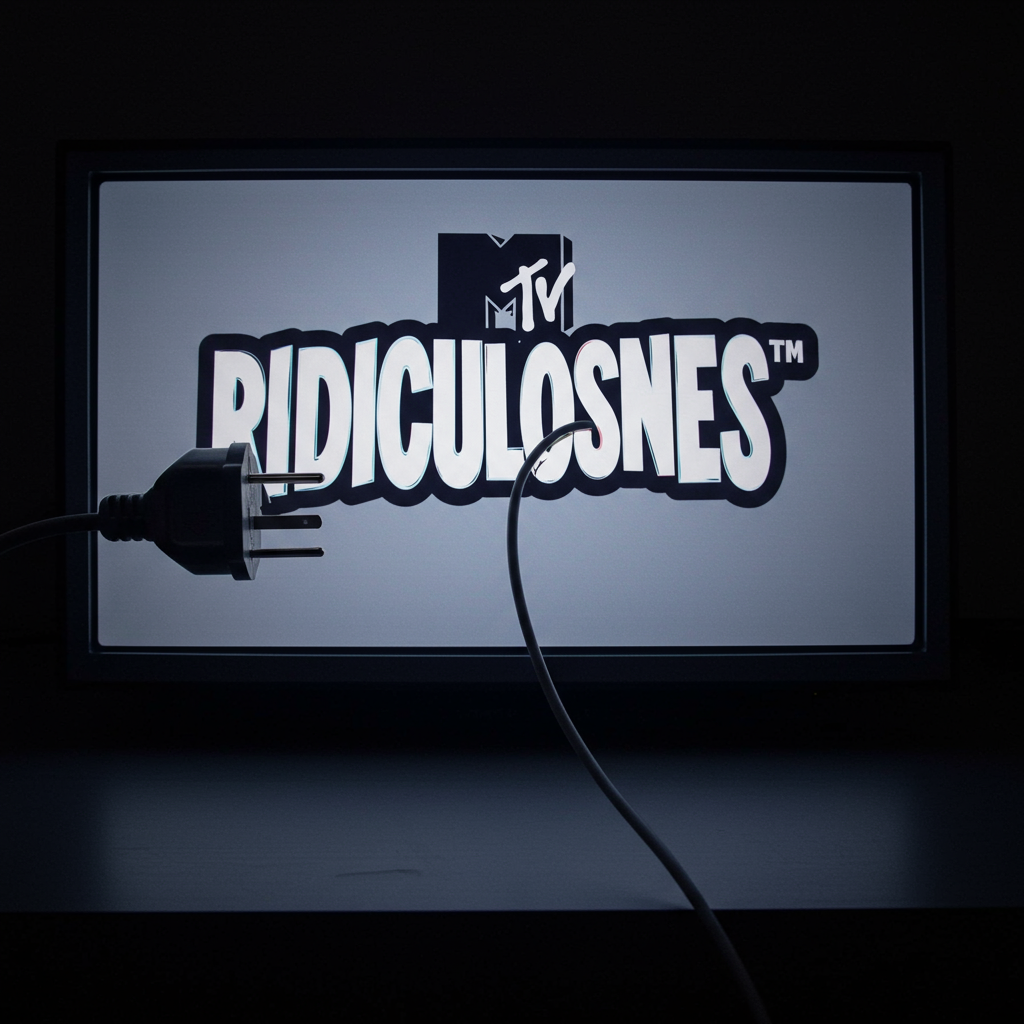The era of endless viral videos and comedic commentary on MTV is drawing to a close. After an unprecedented 14-year run and a staggering 46 seasons, the network has officially pulled the plug on “Ridiculousness,” its longest-running series. This pivotal decision, effective October 31, 2025, marks a significant shift in MTV’s programming strategy. While viewers can still catch previously filmed episodes airing through 2026, and reruns will continue on MTV and Paramount+, the production of new content has ceased. The Ridiculousness cancellation signals a conscious effort by the network to redefine its brand and shed its reputation for over-relying on a single show.
The End of an Unprecedented Run
“Ridiculousness,” hosted by former professional skateboarder Rob Dyrdek, first hit screens in August 2011. It quickly carved a niche, showcasing viral internet videos of audacious failed stunts and “Jackass”-style physical comedy. Dyrdek, alongside co-hosts like Chanel West Coast (who departed in March 2023), Sterling “Steelo” Brim, and Lauren “Lolo” Wood, provided often-hilarious analysis. The show’s format, a “faster, cooler version” of “America’s Funniest Home Videos” as Dyrdek himself once described it, resonated with a broad audience. Over 1,700 episodes were produced, cementing its place in television history.
However, the show’s omnipresence on MTV’s linear schedule became a topic of discussion and even ridicule. For years, “Ridiculousness” reruns famously dominated the network’s lineup. Reports from 2020 indicated it consumed upwards of 113 hours weekly out of MTV’s 168-hour broadcast schedule. This extensive airtime led many industry observers and fans to dub it a symbol of MTV’s “zombie-fication,” lamenting the network’s perceived lack of original, music-oriented programming. The Ridiculousness cancellation now closes this chapter, prompting questions about the network’s future direction.
Why the Curtain Fell: MTV’s Strategic Pivot
The decision to cancel “Ridiculousness” is multifaceted, driven by a strategic reevaluation at MTV. A source familiar with the network’s plans revealed a move towards a “more curated slate of content.” This new direction aims to “embrace its experimental DNA,” introduce “different creative voices,” and implement “refreshed programming.” It appears MTV is consciously attempting to move away from its recent programming patterns.
Redefining MTV’s Identity: “Curated Slate” and “Experimental DNA”
For years, MTV, operating under the Paramount umbrella, faced criticism for losing its original identity. Once a pioneer of music videos and cutting-edge reality television, it increasingly became a repository for “Ridiculousness” reruns. This strategic shift suggests a renewed focus on innovation. The network intends to explore fresh formats and empower diverse creators. This could mean a return to more original series that align with a modern, more dynamic brand image. The push for “experimental DNA” signals a desire to recapture its past glory as a trendsetter in youth culture.
Moving Beyond “Zombie-fication”: Over-Reliance in the Schedule
The show’s consistent airtime filled a significant void as MTV scaled back on original content. While financially beneficial in the short term, this strategy ultimately diluted the network’s brand. The sheer volume of “Ridiculousness” episodes airing weekly contributed to the perception that MTV had abandoned its roots. This move to a “refreshed programming” slate aims to counteract that perception. It seeks to offer viewers a more varied and engaging schedule. The network appears ready to invest in new productions rather than relying heavily on a single, long-running clip show.
The Price of Stunts: Financial Realities
Beyond strategic programming shifts, financial considerations played a significant role in the Ridiculousness cancellation. Producing a show with 46 seasons and over 1,700 episodes, even a clip show, incurs substantial costs, especially regarding host compensation.
Rob Dyrdek’s Substantial Compensation
Just one day before the cancellation news broke, Bloomberg reported on Rob Dyrdek’s significant earnings. According to court documents, MTV was paying Dyrdek at least $32.5 million annually. This substantial compensation package included bonuses, a $21,000 per-episode executive producer fee, and an escalating $61,000 per-episode on-camera fee. These fees compounded rapidly given the network’s practice of ordering hundreds of new episodes each year. Had the series continued, Dyrdek’s projected annual earnings could have climbed to $45 million by 2028-2029. Such figures undoubtedly factored into Paramount’s broader cost-cutting initiatives. Dyrdek had also smartly negotiated “integration rights” early on, allowing him to earn millions through product placements within the show.
Corporate Restructuring and Cost-Cutting
The cancellation also aligns with larger corporate restructuring efforts at Paramount. Following its $8 billion merger with David Ellison’s Skydance, Paramount is undergoing a significant overhaul of its brands. This includes widespread cost-cutting measures and layoffs impacting executives across various Paramount-owned entities, including MTV, CBS, and BET. Superjacket Productions, Dyrdek’s company behind “Ridiculousness,” and its affiliates filed for bankruptcy shortly before the cancellation announcement. While not explicitly stated as the direct cause, this broader context of financial adjustment and corporate consolidation provides crucial background to the decision. The cancellation of such a high-cost program is a clear reflection of Paramount CEO David Ellison’s focus on fiscal prudence.
A Look Back: The Legacy of Ridiculousness
“Ridiculousness” leaves behind a complicated legacy. For some, it was a harmless, entertaining diversion. For others, it symbolized the decline of a once-iconic network.
From Viral Clips to Cultural Staple
The show’s premise was simple yet effective: take the burgeoning world of viral internet videos and add celebrity commentary. Rob Dyrdek, leveraging his MTV reality show experience from “Rob & Big” and “Rob Dyrdek’s Fantasy Factory,” became the perfect ringmaster. His engaging personality, combined with the quick wit of his co-hosts, turned ordinary internet clips into repeatable comedic segments. The show became a go-to for lighthearted entertainment, especially in an era when linear TV was grappling with the rise of on-demand streaming. It was an accessible, low-commitment viewing experience, which partly explains its long and prolific run.
An Unlikely Network Anchor
As MTV pulled back from original dramas, scripted comedies, and its foundational music programming, “Ridiculousness” became an unlikely, yet reliable, programming anchor. It was cheap to produce relative to scripted shows and could be easily rerun. This allowed the network to fill its schedule economically. However, this reliance eventually turned the show into a “punchline” within the industry, seen as a symptom of cable television’s decline in original programming investment. The cancellation signals a potential end to this reliance, forcing MTV to re-evaluate its content strategy more broadly.
What’s Next for MTV?
The “Ridiculousness” cancellation opens a significant amount of airtime in MTV’s schedule. This void provides an opportunity for the network to truly implement its stated goals of “fresh formats, different creative voices, and refreshed programming.” It remains to be seen what specific content will fill this gap. However, the shift suggests a move towards potentially more ambitious or niche reality shows, documentaries, or even a renewed, albeit different, engagement with music culture. The network’s willingness to make such a drastic change hints at a serious commitment to reinventing its brand for the next generation of viewers.
Frequently Asked Questions
Why was Ridiculousness ultimately canceled by MTV?
“Ridiculousness” was canceled due to a combination of factors. MTV is undergoing a strategic shift to develop a “more curated slate of content,” aiming to embrace “experimental DNA” and introduce “different creative voices.” This move is meant to address the network’s historical over-reliance on the show, which often occupied over 100 hours of its weekly schedule. Additionally, significant financial considerations played a role, particularly host Rob Dyrdek’s substantial annual compensation, reportedly exceeding $32.5 million, alongside broader corporate restructuring and cost-cutting initiatives at parent company Paramount following its merger with Skydance.
Where can fans still watch Ridiculousness episodes after the cancellation?
Even though new episodes will no longer be produced, fans of “Ridiculousness” will still have several options to watch the series. Previously filmed first-run episodes are slated to continue airing on MTV through 2026. Beyond that, reruns of the show will persist on MTV’s linear programming schedule. For those who prefer on-demand viewing, select seasons of “Ridiculousness” will remain available for streaming on Paramount+. This ensures that the show’s extensive library will still be accessible to viewers for the foreseeable future.
What does the cancellation of Ridiculousness signal for MTV’s future programming?
The cancellation of “Ridiculousness” signals a major strategic pivot for MTV, moving away from its long-standing reliance on a single clip show. It indicates a clear intention to “reimagine” MTV’s future. The network aims to develop a “more curated slate of content,” featuring “fresh formats, different creative voices, and refreshed programming.” This likely means MTV will invest in new original series, potentially exploring diverse genres within reality television, or even re-engaging with music and youth culture in innovative ways. The move suggests a concerted effort to restore MTV’s brand identity and adapt to the evolving media landscape.
The Next Chapter for MTV
The cancellation of “Ridiculousness” marks the end of a dominant era for MTV. While the show provided consistent viewership and filled extensive airtime for over a decade, its departure signifies a bold step towards reinvention. This move reflects broader trends in the media industry, where traditional networks are grappling with changing viewer habits and the need for fresh, compelling content. As MTV seeks to reclaim its “experimental DNA” and introduce “refreshed programming,” the entertainment world will be watching closely to see what new creative voices and formats emerge to fill the void left by this long-running viral video phenomenon.



